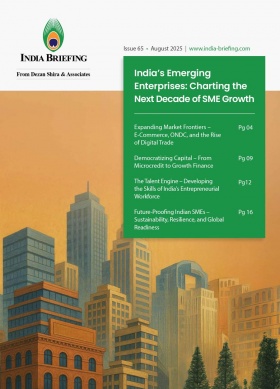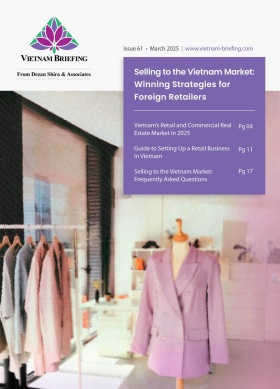How Indian Firms Can Set Up in Vietnam: Practical Insights for Businesses
Discover how Indian firms can set up in Vietnam. Learn about investment trends, legal steps, incentives, and market entry opportunities.
Indian investment in Vietnam
India and Vietnam, two of Asia’s fastest-growing economies, have been steadily strengthening their trade and investment ties. The bilateral trade target of US$20 billion by 2025 is within reach, supported by policy-level cooperation and private sector enthusiasm.
Per data from the IBEF, Indian investments in Vietnam are “estimated at around US$1.9 billion, including investments routed through third countries”.
Indian companies in Vietnam
Indian businesses are finding Vietnam attractive for both cost-competitive production and market access to Southeast Asia and beyond. As of April 2025, Indian firms had registered around 441 projects with cumulative investment exceeding US$1 billion, with a concentration in manufacturing, IT services, energy, and infrastructure.
Some notable examples include:
- Tata Coffee Vietnam (Dak Lak): Freeze-dried coffee plant supplying to global markets;
- ONGC Videsh: Exploration activities in offshore oil and gas blocks;
- Adani Group: Expanding into logistics, energy, and port development with an expected investment of nearly US$5 billion;
- HCL Technologies and Wipro: IT and engineering services delivery centers; and
- Tata Power Solar and Suzlon: Exploring wind and solar power projects.
These projects underline that Indian companies are diversifying their bets in Vietnam, going beyond trading into value-adding operations.
Benefits of Indian companies investing in Vietnam
Vietnam’s success story lies in its ability to combine competitive costs with global integration. For Indian companies, three main categories of opportunities exist:
- Manufacturing and sourcing
- Abundant labor force concentrating in manufacturing and construction, as the sectors account for about 33.4 percent of the total employment.
- Competitive wages compared to China and India in some segments.
- Special Economic Zones (SEZs) and industrial parks with ready-made infrastructure.
- Key sectors: textiles and garments, electronics assembly, food processing, pharmaceuticals, and auto components.
2. Services and technology
- Strong government support for high-tech development and digital transformation.
- Abundant IT talent pool with competitive wages.
- Opportunities for Indian firms in IT/ITES, fintech, edtech, data services, and e-commerce services.
3. Energy and infrastructure
- Vietnam aims to source 47 percent of its power from renewables by 2030.
- Investment prospects for Indian firms in solar, wind, hydropower, and smart-grid projects.
- Port, road, and logistics modernization offering entry points for energy performance certificate (EPCs) and logistics players.
How to start business in Vietnam
Foreign investors can select from several entry vehicles depending on their strategy. The most common include:
- Wholly Foreign-Owned Enterprise (FOE): Full control, ideal for manufacturing and services.
- Joint Venture (JV): Useful in restricted sectors or where local market access is key.
- Representative Office (RO): Non-trading, for research and business liaison.
Step-by-step process to start a business in Vietnam
There are five key steps in the standard procedure for business setup in Vietnam, including:
- Pre-investment approval: Assess sector restrictions under Vietnam’s Law on Investment (2020).
- Apply for Investment Registration Certificate (IRC): Required for foreign capital projects.
- Enterprise Registration Certificate (ERC): Equivalent to business incorporation.
- Corporate e-ID registration: Required for handling online administrative procedures.
- Post-Licensing Requirements: Tax registration, company seal, labor registrations, and bank accounts.
Besides these steps, businesses might also have to obtain other licenses prescribed by law to operate in certain fields.
Also Read: Company Setup Process and Requirements in Vietnam
Timelines
While incorporation typically takes 2–4 weeks if documents are correctly prepared and notarized, additional time may be required for projects in conditional sectors (like telecoms, media, or banking).
In general, it can take about 3-6 months for the whole setup to be completed.
Doing business with Vietnamese suppliers
Many Indian firms also use Vietnam as a procurement and sourcing hub. To mitigate risks, due diligence is critical.
- Verify registration: Check supplier licenses and financial statements.
- Quality and compliance audits: Particularly important for industries like garments and electronics.
- Contracts: Should be bilingual (English–Vietnamese) and specify dispute resolution. International arbitration in Singapore or Hanoi is common.
- Payment practices: US$ is widely used; large transactions typically rely on letters of credit (LCs).
It should be noted that Vietnamese suppliers value long-term partnerships and volume commitments over one-off orders.
Selling to the Vietnam market
Vietnam’s growing consumer base represents a direct market opportunity for Indian firms in addition to sourcing and manufacturing.
- Consumer base: The middle class is projected to reach 20 million by 2030, boosting demand for premium goods, pharmaceuticals, FMCG, and education.
- Retail access: Distribution partnerships with local firms and use of e-commerce platforms like TikTok Shop, Shopee, and Lazada are vital.
- Market positioning: Indian companies should emphasize affordability, quality, and after-sales service to compete against Chinese, Korean, and ASEAN brands.
Legal, tax, and compliance framework
Legal regulations
- Law on Enterprises (2020), last amended by Law No. 76/2025/QH15 – governs corporate structures.
- Law on Investment (2020), last amended by Law No. 57/2024/QH15 – details investment licensing and conditional sectors.
- Sector-specific regulations apply to industries like finance, telecoms, and healthcare.
Taxation
- Corporate Income Tax (CIT): Standard 20 percent, and 15-17 percent for those with revenue of up to VND 50 billion (US$1.9 million).
- Value-Added Tax (VAT): 10 percent (standard), 5 percent (essentials), and 0 percent (exports).
- Withholding Tax (WHT) or Foreign Contractor Tax (FCT): 5 percent–10 percent depending on the nature of payments (royalties, services); applicable to foreign service providers with no legal presence in Vietnam.
Compliance
- Annual audit: All foreign-invested enterprises (FIEs) must undergo audits by a licensed Vietnamese firm.
- Transfer pricing: Governed by Decree No. 132/2020/ND-CP, aligned with OECD BEPS. Documentation is required if transactions exceed specified thresholds.
- Labor and social security: Compulsory contributions to social insurance, health insurance, and unemployment funds.
Incentives
- Tax holidays: Up to 4 years exemption + 9 years reduction for high-tech and priority sectors.
- Reduced CIT: 10, 15, or 17 percent for different time periods, depending on the sector and location of new investment projects.
- Reduced VAT: 2 percent reduction for goods and services subject to the 10 percent VAT rate until December 31, 2026.
- Land rent exemptions: Available for projects in incentivized sectors.
Best locations in Vietnam for Indian firms
Vietnam offers regional clusters that align with different industries:
- Northern Vietnam (Hanoi, Hai Phong, Bac Ninh): Electronics, automotive, IT, logistics.
- Central Vietnam (Da Nang, Quang Ngai): IT outsourcing, tourism, light manufacturing, petrochemicals, and energy.
- Southern Vietnam (Ho Chi Minh City, Dong Nai): FMCG, garments and textiles, financial services, pharma, electronics, furniture, machinery, and packaging.
- Special Economic Zones (e.g., Dung Quat, Phu Quoc, Da Nang): Favorable tax policies and infrastructure for large projects. Da Nang Free Trade Zone, the first of its kind in Vietnam, provides even more attractive incentives with specialized zones for production, logistics, trade and services, digital technology, IT, and innovation hubs.
Leveraging Vietnam’s trade treaties for Indian companies
Vietnam’s strategic network of trade agreements makes it a springboard for global market entry. The country is a signatory to 18 active and planned bilateral and multilateral free trade agreements (FTAs). The most notable of them include:
- India–ASEAN FTA (AIFTA): Tariff reductions benefiting Indian exporters and manufacturers;
- Regional Comprehensive Economic Partnership (RCEP): Facilitates supply chains across Asia-Pacific; and
- EU–Vietnam FTA (EVFTA) & CPTPP: By producing in Vietnam, Indian firms can tap into zero or reduced tariffs when re-exporting to Europe, Japan, and other advanced markets.
This “Vietnam + Global” strategy allows Indian businesses to use Vietnam as both a production base and a gateway to wider trade networks.
Also Read: Compliance Advisory: How Indian Firms Can Qualify for RCEP Benefits in Vietnam
Practical investor FAQs for Indian investors in Vietnam
Q1: What is the minimum capital requirement for a foreign-owned company in Vietnam?
There is no statutory minimum except in conditional sectors (like banking or real estate). Authorities expect the registered capital to be realistic for business operations.
Q2: How long does it take to set up a business?
Although the statutory timeline is relatively short, around 4 weeks, the standard setup process usually takes about 3 months. For larger or regulated projects, this can stretch to 6 months or more.
Q3: Can Indian firms fully own their companies in Vietnam?
Yes, in most sectors. Restrictions apply only in sensitive sectors like telecom, defense, and certain logistics segments.
Q4: What tax incentives are available?
CIT reductions, tax holidays, and land rent exemptions are common. Hi-tech, renewable energy, and education projects receive priority.
Q5: Is Vietnam a good base for re-exporting goods to the US and EU?
Absolutely. Vietnam’s FTAs (EVFTA, CPTPP, RCEP) give it preferential access that Indian firms can leverage by manufacturing locally. However, exporters must pay attention to the specific rules of origin of these FTAs to capitalize on the reduced tariffs.
Q6: How can disputes be resolved?
Contracts often specify arbitration under the Vietnam International Arbitration Centre (VIAC) or international forums like Singapore.
Q7: Do Indian firms need a local partner?
Not in most cases, but joint ventures may be beneficial for market entry or in regulated sectors.
Advisory note
Vietnam offers Indian businesses a unique combination of cost competitiveness, strong trade access, and government-backed incentives. However, success requires careful attention to regulatory compliance, structuring, and local market dynamics.
Indian firms should engage professional advisors who understand Vietnam’s legal, tax, HR, and operational environment. Local professional services firms such as Dezan Shira & Associates provide end-to-end support — from site selection and incorporation to incentive applications, tax optimization, and compliance monitoring — ensuring Indian investors maximize opportunities while staying compliant.
About Us
India Briefing is one of five regional publications under the Asia Briefing brand. It is supported by Dezan Shira & Associates, a pan-Asia, multi-disciplinary professional services firm that assists foreign investors throughout Asia, including through offices in Delhi, Mumbai, and Bengaluru in India. Dezan Shira & Associates also maintains offices or has alliance partners assisting foreign investors in China, Hong Kong SAR, Vietnam, Indonesia, Singapore, Malaysia, Mongolia, Dubai (UAE), Japan, South Korea, Nepal, The Philippines, Sri Lanka, Thailand, Italy, Germany, Bangladesh, Australia, United States, and United Kingdom and Ireland.
For a complimentary subscription to India Briefing’s content products, please click here. For support with establishing a business in India or for assistance in analyzing and entering markets, please contact the firm at india@dezshira.com or visit our website at www.dezshira.com.
- Previous Article Free Trade Warehousing Zones in India
- Next Article India’s Corporate Data Management Scheme – MCA to Open Third Party Bidding on September 30













